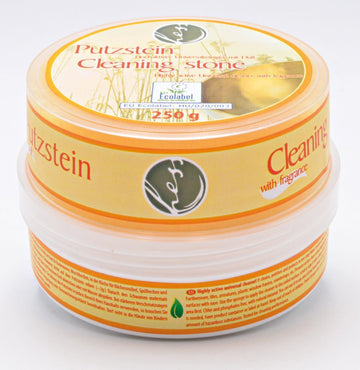
The most important facts in brief
- The metals used in a gong can corrode if not cared for properly.
- Regular cleaning prevents changes in color or shine.
- There are various simple methods for cleaning your gong.
- Our cleaning tips have no effect on the sound of your gong.
- You can prevent soiling by protecting your gong with a cover or bag.
Why are there stains on my gong?
Very frequent handling of your gong and dust or moisture from the air can cause impurities to build up on your gong over time. If a gong is not sealed and comes into contact with salty or acidic liquids, corrosion can occur. Bacteria react with the metal and red-brown stains appear on the surface. Copper emerges and leads to the discoloration of the metal. Although this does not actually damage the gong, it does not look very attractive.
Oils or grease can also lead to oxidation and cause stains on the gong. As a gong is made of different metals, this can also cause electrical stresses that lead to corrosion. If a gong is not sufficiently protected or cleaned regularly, it will lose its shine.
Tip
If you live or travel in areas with a humid climate or spend long periods near the sea, you should pay particular attention to the protection and care of your gong. High humidity or salty air can accelerate corrosion.
How can I clean my gong?
For the care of gongs, we have developed a biodegradable cleaning stone with which you can easily clean and polish your gong.
This is how you proceed:
- Rub lightly over the cleaning stone with a moistened sponge.
- Squeeze the sponge several times to create a fine cleansing foam.
- Rub the inside and outside surfaces of the gong with the damp sponge for a few minutes. (Caution: The cleaning stone may only be applied to the shiny surface of the TamTam gong).
- Wipe the surface with a damp cloth until no residue of the cleaning stone remains.
- Rinse the cloth briefly in between and repeat the process.
- Then rub the gong dry with a soft cloth.

Cleaning gongs with light soiling
For light soiling, we recommend using a soft cotton cloth. Polish the gong with quick movements on the front and back to remove small stains or brake marks from gong drivers. If you warm the cloth slightly beforehand, polishing will be even easier.
How often should I clean my gong and does this affect the sound?
A gong usually develops a very individual patina over time. If you want to preserve the shiny golden color of your gong, we recommend gently cleaning it every two months or so. We recommend regular cleaning, especially for instruments used in sound therapy.
Some gong players rarely clean their instrument intensively. The individual patina that develops even faster as a result distinguishes the gong from others and is often even desirable. In this case, occasional gentle cleaning with a soft cloth is sufficient to remove fingerprints and dirt.
The sound of the gong is not affected by careful, regular cleaning. However, we advise you to follow our tips to avoid damaging the surface.

How to protect your gong
It is best to store your gong in a soft case or gong bag. Your gong should be well protected, especially during transportation or when you are not using it for a longer period of time.






